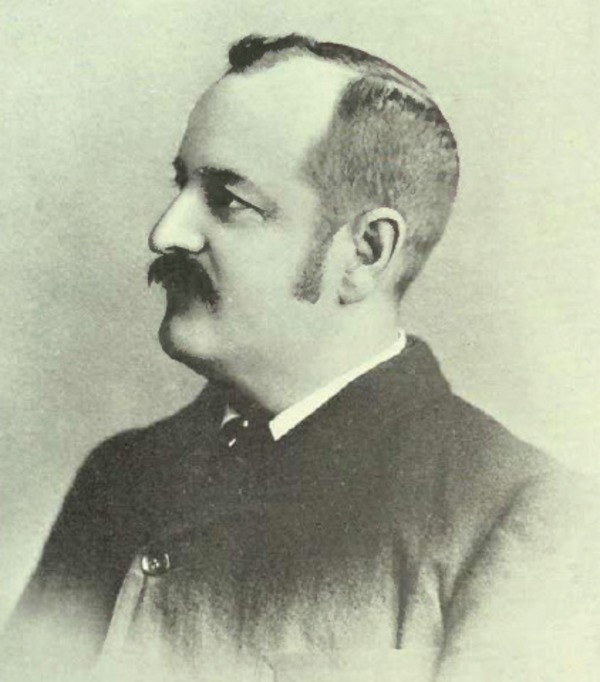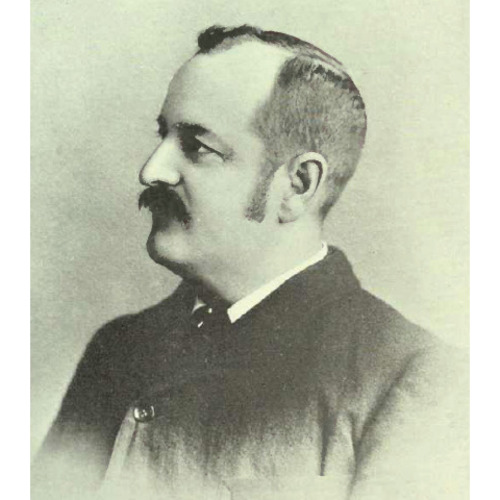
Source: Link
PYNE, ROBERT ALLAN, physician, politician, and office holder; b. 29 Oct. 1853 in Newmarket, Upper Canada, son of Thomas Pyne and Hester Jane Roberts; m. 17 Nov. 1880 Mary (Minnie) Isabel McQueen (Macqueen) in East Zorra Township, Ont., and they had a daughter and two sons; d. 18 June 1931 in Toronto.
Robert Pyne, whose father was a doctor originally from Waterford (Republic of Ireland), received his early schooling in Newmarket and Hagersville before going on to study at the University of Toronto, where he earned his mb (1878) and md (1880). In a 1912 biographical entry he would be described by author Henry James Morgan* as an outdoor-sports enthusiast and “a famous cricketer.” Pyne began a practice in the city and soon succeeded his father as registrar of the College of Physicians and Surgeons of Ontario. He also served on Toronto’s Board of Education and the Board of Health. In the provincial election of 1 March 1898 he ran as a Conservative and won a seat in the Legislative Assembly. He would remain there for 20 years, representing Toronto East (1898–1914) and the newly created riding of Toronto Northeast (1914–18). He initially sat in opposition to the Liberal governments of Arthur Sturgis Hardy* and George William Ross*. After the Conservatives won office in 1905, Premier James Pliny Whitney* appointed Pyne to the cabinet as minister of education.
Pyne, who succeeded Richard Harcourt as minister, would preside over the Department of Education for the next 13 years. Aided from 1906 by deputy minister Arthur Hugh Urquhart Colquhoun, Pyne moved to improve the quality of Ontario’s schools. The Department of Education Act of 1906 set minimum requirements for the certification of teachers, and amendments to the Public Schools Act raised the salaries for teachers and inspectors in rural areas. These changes were implemented in the face of widespread opposition from local trustees. After a provincial commission reported that year on the high price and poor quality of school texts, Pyne established a tender system to raise standards through competition and make the books more affordable. He also gradually replaced traditional model schools with more rigorous normal schools that provided better training for teachers, and in 1915 he would improve teachers’ pensions.
Other significant reforms were instituted. The Industrial Education Act of 1911, championed by department superintendent John Seath*, authorized municipalities to set up technical schools and promised them funding for this purpose. It was followed by the Auxiliary Classes Act of 1914, which allocated funds for the construction of alternative schools for children with physical and mental disabilities. Pyne’s view that such children had the right to a public education, albeit in separate facilities, was supported by Dr Helen MacMurchy*, a noted child-welfare advocate. The legislation increased funding for the Ontario Institution for the Education and Instruction of the Deaf and Dumb in Belleville [see Robert Mathison*] and the Ontario Institution for the Education and Instruction of the Blind in Brantford [see Alfred Hutchison Dymond*].
Controversially, Pyne introduced education reforms that affected bilingual schools in the province and strained English–French relations across Canada. In 1910 Pyne was facing pressure from the Orange order (of which he was a staunch member), from some of Ontario’s Roman Catholic bishops, led by Michael Francis Fallon, and from fellow Conservatives such as future premier George Howard Ferguson* to eliminate English-French schools. Following a meeting between Whitney, Pyne, Colquhoun, and Seath, Pyne’s chief inspector, Francis Walter Merchant, was asked to investigate allegations that these institutions were providing a substandard education. Merchant’s 1912 report identified problems in their work and recommended better training for their teachers. The report’s effect, however, was to prompt calls for the outright abolition of the schools. In response to these demands, Pyne issued “Circular of Instructions, 17,” better known as Regulation 17, which forbade the use of French as a language of instruction and communication beyond the first form (the first two years of study), limited the teaching of French as a subject to one hour a day, and allowed such lessons only at the request of parents and in schools where French had been taught before 1912. To ensure that all bilingual schools adhered to this new policy, separate-school inspectors, who were normally French and Catholic, were placed under the authority of public-school inspectors, who at the time were uniformly English and Protestant. Throughout the struggle that ensued over the Ontario schools question, as it became known, Pyne would remain an advocate of Regulation 17. “Although born in Canada,” the Toronto Daily Star later put it, “his viewpoint was that of the Ulster Orangeman.”
The Whitney government’s decision to curb French instruction caused some parents to protest by removing their children from school. In February 1913, after Pyne issued an edict that “the regulations now in force are to be carried out in every respect,” Charles Siméon Omer Boudreault, president of the Association Canadienne-Française d’Éducation d’Ontario [see Napoléon-Antoine Belcourt], told the Star: “Under no circumstances will the French-Canadians of Ontario accept regulation 17.… We will not submit to anything but the recognition of the parents’ rights. The substitution of English-speaking Protestant inspectors for French inspectors will meet with the same reception as before – the children will walk out of the schools.” Two years later, after Ottawa’s separate-school board refused to carry out the new policy [see Samuel McCallum Genest], Whitney’s successor, William Howard Hearst*, replaced the board with a specially appointed commission, an action that was eventually ruled unconstitutional by the Judicial Committee of the Privy Council. Regulation 17 would be enforced until 1927, the year that a report co-authored by Merchant concluded that its impact on the province’s schools had been harmful.
Pyne’s medical background was sometimes useful in his political life, especially in early 1914, when he organized the ailing Whitney’s medical treatment and assumed leadership of the government. When Hearst became premier in October, shortly after Whitney’s death and the outbreak of the First World War, Pyne kept his post as minister of education. Commissioned a lieutenant-colonel in the Canadian Army Medical Corps on 22 June 1915, Pyne sailed for England two months later to supervise the establishment of the Ontario Military Hospital in Orpington (London), which treated wounded Canadian and other Allied soldiers. The facility, which opened in February 1916 and was renamed No.16 General Hospital in September 1917, eventually had a capacity of over 2,000 patients. Pyne, whose two sons, Frederick Roberts and Francis Herbert Wandaford, served in the Canadian Expeditionary Force, spent considerable time in England during the war overseeing the expansion of the hospital, which was commanded by Colonel David William McPherson.
After his final return to Canada, weary from his demanding schedule and prolonged visits overseas, Robert Allan Pyne chose to retire from politics. He left the cabinet and the legislature in May 1918 and was succeeded by Henry John Cody*. Afterwards, Pyne served as clerk of York County and then as sheriff of Toronto, a post he held from 1923 until his sudden death from a heart attack in 1931.
A physician, public servant, British patriot, and proud Orangeman, Robert Allan Pyne was overseer of the Ontario education system in an era of profound social change. He was unafraid to advocate school reforms that he believed improved standards for teachers and students alike. His policies on bilingual schools were so controversial that they would continue to be a subject of debate in the early 21st century.
Toronto Daily Star, 17 Feb. 1913; 29 April 1914; 8 April, 26 May 1915; 26 April, 2 Nov. 1916; 19 June 1931. J. D. Cecillon, Prayers, petitions, and protests: the Catholic Church and the Ontario schools crisis in the Windsor border region, 1910–1928 (Montreal and Kingston, Ont., 2013). Robert Choquette, Language and religion: a history of English-French conflict in Ontario (Ottawa, 1975). C. W. Humphries, “Honest enough to be bold”: the life and times of Sir James Pliny Whitney (Toronto, 1985). F. W. Merchant, Report on the condition of English-French schools in the province of Ontario (Toronto, 1912). Ont., Committee appointed to enquire into the condition of the schools attended by French-speaking pupils, Report (Toronto, 1927).
Cite This Article
Jack Cecillon, “PYNE, ROBERT ALLAN,” in Dictionary of Canadian Biography, vol. 16, University of Toronto/Université Laval, 2003–, accessed December 21, 2025, https://www.biographi.ca/en/bio/pyne_robert_allan_16E.html.
The citation above shows the format for footnotes and endnotes according to the Chicago manual of style (16th edition). Information to be used in other citation formats:
| Permalink: | https://www.biographi.ca/en/bio/pyne_robert_allan_16E.html |
| Author of Article: | Jack Cecillon |
| Title of Article: | PYNE, ROBERT ALLAN |
| Publication Name: | Dictionary of Canadian Biography, vol. 16 |
| Publisher: | University of Toronto/Université Laval |
| Year of publication: | 2023 |
| Year of revision: | 2023 |
| Access Date: | December 21, 2025 |



